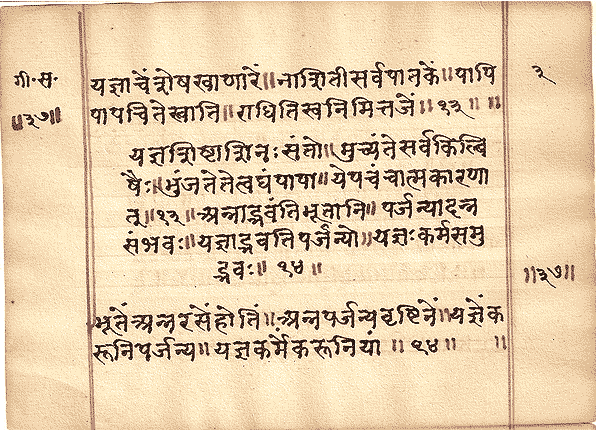BhG 3.13
yajña-śiṣṭāśinaḥ santo mucyante sarva-kilbiṣaiḥ
bhuñjate te tv aghaṃ pāpā ye pacanty ātma-kāraṇāt
To play the media you will need to either update your browser to a recent version or update your Flash plugin.
syntax
yajña-siṣṭāśinaḥ (those who eat the remnants of sacrifice) santaḥ (saints) sarva-kilbiṣaiḥ (from all sins) mucyante (they are released),
ye tu (but those who) ātma-kāraṇāt (for the own sake) pacanti (they cook),
te (these) pāpāḥ (sinners) agham (evil) bhuñjate (they eat).
grammar
| yajña-śiṣṭāśinaḥ | – | yajña-śiṣṭa-āśin 1n.3 m.; TP: yajñasya śiṣṭāni āsina iti – those who eat the remnants of sacrifice (from: √yaj – to consecrate, to sacrifice, to worship, yajña – sacrifice, worship, name of Viṣṇu; √śiṣ – to leave, PP śiṣṭa – left, remnants; √aś – to reach, to eat, to enjoy, āśin – one who eats, enjoys; -in, -min, -vin – sufixes meaning one who possesses); |
| santaḥ | – | sant (√as – to be) PPr 1n.3 m. – being, true, existing, saints; |
| mucyante | – | √muc (to liberate, to release) Praes. pass. 1v.3 – they are released (from what? – pass. requires instrumental or ablative); |
| sarva-kilbiṣaiḥ | – | sarva-kilbiṣa 3n.3 n.; sarvair kilbiṣaiṛ iti – from all sins (from: sarva – all, whole; kilbiṣa – fault, offence, sin); |
| bhuñjate | – | √bhuj (to eat, to enjoy) Praes. Ā 1v.3 – they eat; |
| te | – | tat sn. 1n.3 m. – they; |
| tu | – | av. – but, then, or, and; |
| agham | – | agha 2n.1 n. – evil, sin, suffering; |
| pāpāḥ | – | pāpa 1n.3 m. – sinners, wicked people; |
| ye | – | yat sn. 1n.3 m. – those who; |
| pacanti | – | √pac (to cook, to digest) Praes. P 1v.3 – they cook; |
| ātma-kāraṇāt | – | ātma-kāraṇa 5n.1 n.; TP: ātmanaḥ kāranāt iti – from the cause of one’s self, for the own sake (from: ātman – self; √kṛ – to do, karaṇa – deed, direct cause, instrument, helper, kāraṇa – cause, motive, principle, the means); |
textual variants
yajña-siṣṭāśinaḥ → yajña-siṣṭāśanaḥ (those who have as food the remnants of the sacrifice);
sarva-kilbiṣaiḥ → te ‘pi kilbiṣaiḥ (they even from sins);
bhuñjate te tv aghaṁ pāpā → te tv aghaṁ bhuṁjate pāpā (but those sinners eat sin);
Śāṃkara
The key:
an excerpt from the commented verse
quotes from the scriptures
starting polemic
|
On the other hand, |
ye punaḥ – | |
|
The righteous, who eat the remnant of the sacrifice, are freed from all sins; |
yajña-śiṣṭāśinaḥ santo mucyante sarva-kilbiṣaiḥ | bhuñjate te tv aghaṃ pāpā ye pacanty ātma-kāraṇāt ||3.13|| |
|
|
Those who, after performing sacrifices to the Gods, &c., eat the remains of the food – which is called amṛta, ambrosia – are freed from all sins committed at the five places of animal-slaughter (such as the fire-place), as well as from those sins which result from involuntary acts of injury and other causes. |
deva-yajñādīn nirvartya tac-chiṣṭam aśanam amṛtākhyam aśituṃ śīlaṃ yeṣāṃ te yajña-śiṣṭāśinaḥ santo mucyante sarva-kilbiṣaiḥ sarva-pāpaiś culiy-ādi-pañca-sūnā-kṛtaiḥ pramāda-kṛta-hiṃsādi-janitaiś cānyaiḥ | | |
|
But as to the others, who are selfish and cook food for their own sakes, what they eat is sin itself, while they themselves are sinners. |
ye tv ātmaṃbharayo bhuñjate te tv aghaṃ pāpaṃ svayam api pāpā ye pacanti pākaṃ nirvartayanti ātma-kāraṇāt ātma-hetoḥ ||3.13|| |
Rāmānuja
tad eva vivṛṇoti
indrādyātmanāvasthitaparamapuruṣārādhanārthatayaiva dravyāṇy upādāya vipacya tair yathāvasthitaṃ paramapuruṣam ārādhya tacchiṣṭāśanena ye śarīrayātrāṃ kurvate, te tv anādikālopārjitaiḥ kilbiṣaiḥ ātmayāthātmyāvalokanavirodhibhiḥ sarvair mucyante / ye tu paramapuruṣeṇendrādyātmanā svārādhanāya dattāni ātmārthatyopādāya vipacyāśnanti, te pāpātmano ‚gham eva bhuñjate / aghapariṇāmitvād agham ity ucyate / ātmāvalokanavimukhāḥ narakāyaiva pacante
Śrīdhara
ataś ca yajanta eva śreṣṭhāḥ | netara ity āha yajña-śiṣṭāśina iti | vaiśva-devādi-yajñāvaśiṣṭaṃ ye ‚śnanti te pañcasūnākṛtaiḥ sarvaiḥ kilbiṣair mucyante | pañca-sūnāś ca smṛtāv uktāḥ –
kaṇḍanī peṣaṇī cullī udakumbhī ca mārjanī |
pañca-sūnā gṛhasthasya tābhiḥ svargaṃ na vindati || iti ||
ye ātmano bhojanārtham eva pacanti, na tu vaiśvadevādy-arthaṃ te pāpā durācārā agham eva bhuñjate
Madhusūdana
ye tu vaiśvadevādi-yajñāvaśiṣṭam amṛtaṃ ye ‚śnanti te santaḥ śiṣṭā vedokta-kāritvena devādy-ṛṇāpākaraṇāt atas te mucyante sarvair vihitākaraṇa-nimittaiḥ pūrva-kṛtaiś ca pañca-sūnā-nimittaiḥ kilbiṣaiḥ | bhūta-bhāvi-pātakā-saṃsargiṇas te bhavantīty arthaḥ |
evam anvaye bhūta-bhāvi-pāpābhāvām uktvā vyatireke doṣam āha bhuñjate te vaiśvadevādy-akāriṇo ‚ghaṃ pāpam eva | tu-śabdo ‚vadhāraṇe | ye pāpāḥ pañca-sūnā-nimittaṃ pramāda-kṛta-hiṃsā-nimittaṃ ca kṛta-pāpāḥ santa ātma-kāraṇād eva pacanti na tu vaiśvadevādy-artham | tathā ca pāñca-sūnādi-kṛta-pāpe vidyamāna eva vaiśvadevādi-nitya-karmākaraṇa-nimittam aparaṃ pāpam āpnuvantīti bhuñjate te tv aghaṃ pāpā ity uktam | tathā ca smṛtiḥ –
kaṇḍanī peṣaṇī cullī udakumbhī ca mārjanī |
pañca-sūnā gṛhasthasya tābhiḥ svargaṃ na vindati ||iti |
pañca-sūnākṛtaṃ pāpaṃ pañca-yajñair vyapohati iti ca | śrutiś ca idam evāsya tat-sādhāraṇam annaṃ yad idam adyate | sa ya etad upāste na sa pāpnamo vyāvartate miśraṃ hy etat iti | mantra-varṇo ‚pi –
mogham annaṃ vindate agra-cetāḥ
satyaṃ bravīmi vadha itsa tasya |
nāryamāṇaṃ puṣyati no sakhāyaṃ
kevalādho bhavati kevalādī ||iti |
idaṃ copalakṣaṇaṃ pañca-mahā-yajñānāṃ smārtānāṃ śrautānāṃ ca nitya-karmaṇām | adhikṛtena nityāni karmāṇy avaśyam anuṣṭheyānīti prajāpati-vacanārthaḥ
Viśvanātha
vaiśvadevādi-yajñāvaśiṣṭam annaṃ ye ‚śnanti te pañca-sūnākṛtaiḥ sarvaiḥ pāpair mucyante | pañca-sūnāś ca smṛty-uktāḥ –
kaṇḍanī peṣaṇī cullī udakumbhī ca mārjanī |
pañca-sūnā gṛhasthasya tābhiḥ svargaṃ na vindati || iti
Baladeva
ye indrādy-aṅgatayāvasthitaṃ yajñaṃ sarveśvaraṃ viṣṇum abhyarcya tac-cheṣam aśnanti tena tad-deha-yātrāṃ sampādayanti te santaḥ sarveśvarasya yajña-puruṣasya bhaktāḥ sarva-kilbiṣair anādi-kāla-vivṛddhair ātmānubhava-pratibandhakair nikhilaiḥ pāpair vimucyante | te tu pāpāḥ pāpa-grastāḥ agham eva bhuñjate | ye tat-tad-devatāṅgatayāvasthitena yajña-puruṣeṇa svārcanāya dattaṃ vrīhy-ādy-ātma-kāraṇāt pacanti tad vipacyātma-poṣaṇaṃ kurvantīty arthaḥ | pakvasya vrīhy-āder agha-rūpeṇa pariṇāmād aghatvam uktam
- Copyright © 2010-2013 Quo Vadis Vision. Wszelkie prawa zastrzeżone.
- |
- About the project
- Appendices
- Audio
- Forum
- Contact

